#seymour sonntag
Text






Made the gang in the sims!!! There are a few things I wish I could change but obv I can only be so thorough skdjsjd
Left to Right:
Summer, Elysio
Versailles, Citrine
Carlyle, Seymour
#courier carlyle#courier summer#elysio autumn#versailles diamandis#citrine fontaine#seymour sonntag#also Seymour is my new fo4 oc lol just some dad#ts4#also couldnt get most of their skin tones right aaaaa
9 notes
·
View notes
Photo
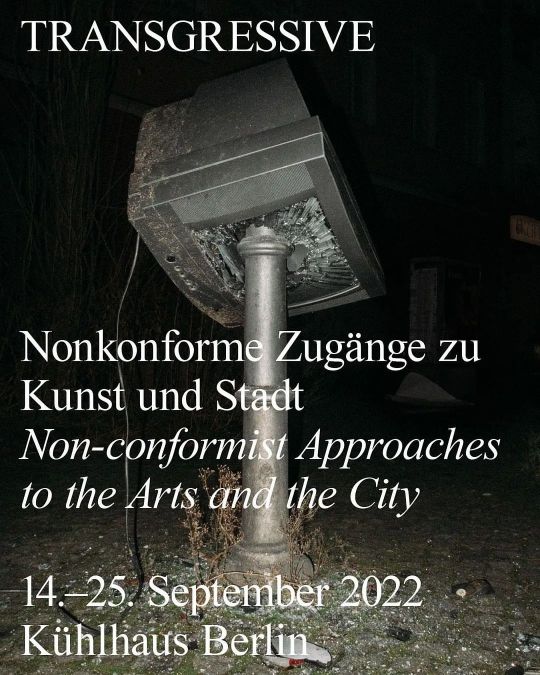
Schwer zu empfehlende Ausstellung, Symposium, Buchmesse und Memorial. TRANSGRESSIVE. NON-CONFORMIST APPROACHES TO THE ARTS AND THE CITY Mit: Akim, Clemens Behr, Ulrike Bernard, Boris D94, Rafaella Braga, Thomas Bratzke, Markus Butkereit, DIAMONDS, Brad Downey, Larissa Fassler, Anna Fiedler, Carolin Genz, Jürgen Große, Marie Grunwald, Vincent Grunwald, Guerilla Architects, Alice Hauck & Laila Wiens, Anna Herms, Wilhelm Klotzek, Fabian Knecht, Van Bo Le-Mentzel, Jeewi Lee, Mischa Leinkauf, Markus Mai, Thomas Marecki, Kadir Amigo Memiş, Adrian Nabi, Jana Sophia Nolle, Pigenius Cave, POLIGONAL, Katya Quel, Thomias L. Radin, Susi Rosenbohm, Sandra Rummler, Christian Schellenberger, Gabi Schillig, Osif Seiksuh, Diana Sirianni, Ronny Sonnenberg, Studio Alibi, Birgit Szepanski, The WA, Katharina Trudzinski, Aylin Yildirim Tschoepe, Raul Walch, Daniel Weissbach, Eric Winkler, Jazoo Yang 16.09. 17.00 – 20.00 SYMPOSIUM: TRANSGRESSIVE APPROACHES IN ART AND ACADEMIA mit Prof. Lukas Feireiss, (Transdisciplinary Artistic Education, Universität der Künste Berlin), Prof. Benjamin Foerster-Baldinius (Cohabitation, Städelschule Frankfurt), Dr. Carolin Genz (Urban Ethnography Lab, Humboldt-Universität zu Berlin), Prof. Gabi Schillig (Raumklasse, Universität der Künste Berlin), Joachim Spurloser & Stefan Wartenberg (Graffitimuseum Berlin), Jerszy Seymour (Dirty Art Department, Sandberg Instituut Amsterdam). Kühlhaus Berlin, Luckenwalder Str. 3 10963 Berlin geöffnet Donnerstags–Sonntags 12:00–18:00 Kuratiert von @lukasfeireiss Ausstellungsdesign @parasiteparasite Fotos @benjakon Gestaltung @possible_books https://www.instagram.com/p/Cihio_rIXMD/?igshid=NGJjMDIxMWI=
5 notes
·
View notes
Photo
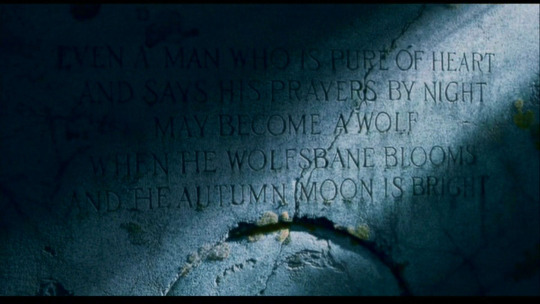
The Wolfman (2010), dir. Joe Johnston
Even a man who is pure in heart
and says his prayers by night
may become a wolf
when the wolfbane blooms
and Autumn moon is bright.
— Curt Siodmark, from “The Wolf Man (1941, dir. Georg Waggner)”
About the author, from Wikipedia:
Siodmak was born Kurt Siodmak in Dresden, Germany, the son of Rosa Philippine (née Blum) and Ignatz Siodmak. His parents were both from Jewish families in Leipzig. Siodmak acquired a degree in mathematics before beginning to write novels. He invested early royalties earned by his first books in the 1929 movie Menschen am Sonntag, a documentary-style chronicle of the lives of four Berliners on a Sunday based on their own lives. The movie was co-directed by Curt Siodmak's older brother Robert Siodmak and Edgar G. Ulmer, with a script by Billy Wilder in collaboration with Fred Zinnemann and cameraman Eugen Schüfftan. Siodmak was the nephew of film producer Seymour Nebenzal, who funded Menschen am Sonntag with funds borrowed from his father, Heinrich Nebenzahl.
In the following years Siodmak wrote many novels, screenplays, and short stories, including the novel F.P.1 antwortet nicht (F.P.1 Doesn't Answer) (1932) which was adapted into a film featuring Hans Albers and Peter Lorre.
Siodmak decided to emigrate after hearing an anti-Semitic tirade by the Nazi propaganda minister Joseph Goebbels, and departed for England where he made a living as a screenwriter before moving to the United States in 1937. His big break in Hollywood came with the screenplay for The Wolf Man (1941), starring Lon Chaney, Jr., which established this fictional creature as the most popular movie monster after Dracula and Frankenstein's monster. In the film, Siodmak created several werewolf "legends" — being marked by a pentagram; being practically immortal apart from being struck/shot by silver implements/bullets; and the famous verse [...]
#The Wolfman#Wolfman#Wolfman (2010)#Joe Johnston#Curt Siodmak#Kurt Siodmak#Menschen am Sonntag#Billy Wilder#cw: WWII#cw: antisemitism#The Wolf Man#The Wolf Man (1941)#1940s#werewolves#folklore#legends#film history#film quotes#Old Hollywood
34 notes
·
View notes
Photo

Off to next peak • • • • • • • • • • #fitxchemnitz #wochenende #fitx #pumpen #fitfamgermany #vonnixkommtnix #fitnessjourney #cleverfit #bodyengineers #gymshark #chemnitz #berlin #sonntag #machdichkrass #leipzig #imnotlikeyou #music #sachsen #stuttgart #munchen #köln #leipzig #zecplus #frankfurt 😘 #iwill #underground #0711 #machdichwahr #sonia😎😘 (at Seymour Mountain) https://www.instagram.com/p/B15RHwcD_Bw/?igshid=1ge4j5v7bf9c8
#fitxchemnitz#wochenende#fitx#pumpen#fitfamgermany#vonnixkommtnix#fitnessjourney#cleverfit#bodyengineers#gymshark#chemnitz#berlin#sonntag#machdichkrass#leipzig#imnotlikeyou#music#sachsen#stuttgart#munchen#köln#zecplus#frankfurt#iwill#underground#0711#machdichwahr#sonia😎😘
1 note
·
View note
Photo

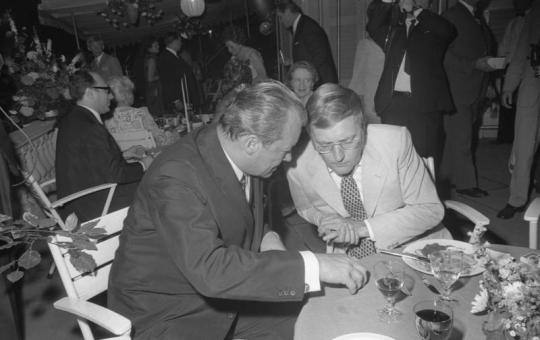

Der Spiegel (Eigenschreibweise: DER SPIEGEL) ist ein deutsches Nachrichtenmagazin, das im Spiegel-Verlag in Hamburg erscheint.
Das Spiegel-Gebäude in Hamburg
Die verkaufte Auflage beträgt 719.326 Exemplare, ein Minus von 31,9 Prozent seit 1998.
Aufgrund seines Einflusses auf die öffentliche Meinungsbildung wird das Blatt oft als ein Leitmedium in Deutschland bezeichnet. In der bundesdeutschen Pressegeschichte nehmen Der Spiegel und sein Gründer Rudolf Augstein eine wichtige Rolle ein. Das 1947 gegründete Blatt erlangte seine Bedeutung im Kampf für die Pressefreiheit und durch die Enthüllung politischer Affären. Es ist Gründungsmitglied der 2016 initiierten European Investigative Collaboration (EIC).
Erstausgabe 4. Januar 1947
Gründer Rudolf Augstein
Erscheinungsweise wöchentlich (samstags)
Verkaufte Auflage 719.326 Exemplare
Verbreitete Auflage 726.149 Exemplare
Reichweite 5,29 Mio. Leser
Chefredakteure Steffen Klusmann(Vorsitzender), Barbara Hans, Clemens Höges
Herausgeber Rudolf Augstein (1923–2002)
Geschäftsführer Thomas Hass
Weblink www.spiegel.de/spiegel
Die Redaktion kooperiert mit Spiegel Online, das ebenfalls zum Spiegel-Verlag gehört, aber redaktionell und unternehmerisch vom Magazin getrennt ist. Es gab Überlegungen und Bestrebungen, beide Redaktionen zusammenzulegen oder die Mitarbeiter von Spiegel Online gleichwertig zu stellen.
Gründer Rudolf Augstein
Augstein mit Willy Brandt, 1970 und beim FDP-Bundesparteitag 1980
Augstein wuchs katholisch auf, trat jedoch 1968 aus Protest gegen die Enzyklika Humanae Vitae aus der katholischen Kirche aus, wollte keiner Kirche mehr angehören und blieb zeitlebens ein überzeugter Atheist und scharfer Kirchenkritiker. Augstein „wolle nicht mehr zu einer Kirche gehören, die im Namen Gottes die Pille verbiete, die gegen die Ehescheidung polemisiere und die Wahlen durch Hirtenbriefe beeinflussen wolle“. Der Institution Kirche könne er nur Misstrauen entgegenbringen, da er davon ausging, dass der Schaden, den sie anrichtet, größer sei als ihr sozialer Nutzen.
Rudolf Augstein starb am 7. November 2002, zwei Tage nach seinem 79. Geburtstag, in Hamburg an den Folgen einer Lungenentzündung. Die Beisetzung fand am 19. November 2002 auf dem Friedhof der evangelisch-lutherischen Severin-Kirche in Keitum statt, eine Trauerfeier folgte am 25. November in der Hauptkirche Sankt Michaelis (Hamburg). Von Konfessionslosen, Freidenkern und Atheisten wurde dies scharf kritisiert und von einer nachträglichen Vereinnahmung Augsteins durch die Kirche gesprochen, die nicht im Sinne des Toten gewesen wäre.
Nach Ende des Krieges war Augstein zunächst Redakteur des Hannoverschen Nachrichtenblatts. 1946 wurde er von den britischen Presseoffizieren John Seymour Chaloner, Harry Bohrer und Henry Ormond als Redakteur für ihre Wochenzeitschrift Diese Woche rekrutiert, die sich als Lizenzzeitung am Vorbild der britischen News Review und des amerikanischen Time-Magazins orientieren sollte. Nach nur sechs Ausgaben ordnete das britische Foreign Officeaber wegen der Kritik, die im Magazin auch an den Besatzungsmächten geübt wurde, die sofortige Einstellung an. Chaloner erlangte zumindest die Erlaubnis, die Zeitschrift in deutsche Hände zu übergeben. So erwarb Augstein gemeinsam mit dem Fotografen Roman Stempka und dem Redakteur Gerhard R. Barsch in Hannover die Verlegerlizenz. Augstein wurde Chefredakteur und Herausgeber und brachte am 4. Januar 1947 die Erstausgabe des Nachrichtenmagazins unter dem neuen Titel DER SPIEGEL im Verlagshaus des Anzeiger-Hochhauses in Hannover heraus.
Im Januar 1949 wurde Augstein erstmals für eine Meldung im Spiegel angeklagt, nachdem das Magazin berichtet hatte, dass bei einer Hausdurchsuchung beim Kieler Ex-Agrarminister Erich Arp Fleischbüchsen gefunden worden waren. Augstein wurde vor Gericht freigesprochen.
1952 kam es wegen eines Artikels über Herbert Blankenhorn zur bundesweiten Beschlagnahme der (bereits ausgelieferten) „Spiegel“-Ausgabe 28/1952. 2007 wurde bekannt, dass Augstein in diesem Zusammenhang in den 1950ern den Staatsrechtler Carl Schmitt, der aufgrund seines Einsatzes für den Nationalsozialismus als „Kronjurist des Dritten Reiches“ bezeichnet wurde, um juristischen Rat für eine Verfassungsbeschwerde ersuchte und auch eine Zeit lang eine Korrespondenz mit ihm unterhielt. Das Verfahren endete im September 1955 mit einem Vergleich.
Als der Spiegel in Ausgabe 41/1962 unter dem Titel „Bedingt abwehrbereit“ einen Artikel veröffentlichte, der, gestützt auf vertrauliche Berichte zum NATO-Manöver Fallex 62, das Verteidigungskonzept der Bundeswehr in Frage stellte, besetzte die Polizei – auf Betreiben von Verteidigungsminister Franz Josef Strauß – am 26. Oktober 1962 die Redaktionsräume und nahm in der Folge Augstein und sieben andere Mitarbeiter unter Verdacht des Landesverrats fest (siehe Spiegel-Affäre). Die Festnahmen lösten eine Welle von Protesten aus. Nach 103 Tagen Untersuchungshaft wurde Augstein im Februar 1963 entlassen. Bereits am 30. November 1962 wurde Strauß wegen der Affäre zum Rücktritt vom Amt des Verteidigungsministers gezwungen und zog sich daraufhin zeitweise in die bayerische Landespolitik zurück. Man sprach vom „Anfang des Endes“ der Ära Adenauer, der ebenfalls noch im selben Jahr zurücktrat. Kurz vor seinem Tod empfing Adenauer Augstein noch für ein Gespräch.
In den 1960er Jahren gründete Augstein die Rudolf Augstein Stiftung, die seinen Nachlass verwalten und sich unter anderem für wohltätige Zwecke einsetzen soll.
Frühe 80er
Am 18. Januar 1993 erschien die erste Ausgabe des Focus, nach Aussage des Chefredakteurs Helmut Markwort als „Konkurrenz-, nicht Gegenmedium zum Spiegel“. Danach kam es zu deutlich wahrnehmbaren Veränderungen. Focus wurde bewusst als Gegenpol und Alternative zum Spiegel konzipiert; nachweisbar ist das insbesondere an der politischen Linie und dem vergleichsweise schonenden Umgang mit den Anzeigenkunden. Uli Baur, neben Markwort Chefredakteur des Focus, fasste die redaktionelle Linie des Focus unter Bezugnahme auf das bekannte Augstein-Zitat („[��] im Zweifelsfalle links“) deutlich zusammen: „Wenn Der Spiegel im Zweifel links ist, sind wir im Zweifel rechts.“
Das Blatt erlitt einen Auflagenverlust von mehr als zehn Prozent und einen Rückgang der verkauften Anzeigenseiten um mehr als zwölf Prozent. 1995 lag die Anzahl der Leser bei über sieben Millionen. Es entstanden Spiegel TV und Spiegel Special, die ein Fünftel des Spiegel-Umsatzes von 542 Millionen D-Mark (1996) generierten. Der Spiegel war im ersten Halbjahr 1996 „die deutsche Zeitschrift mit den höchsten Einnahmen aus Vertrieb und Anzeigen.“ Erzielt wurden Bruttoeinnahmen von 330,7 Millionen D-Mark, das war knapp eine Million mehr als der Stern (Platz 2) erzielen konnte und lag noch vor Bild am Sonntag (Platz 3) und Focus. Im Januar 1997 feierte Der Spiegel 50. Geburtstag. Bis dahin waren 2.649 Ausgaben erschienen. Man aktualisierte das Layout, das seitdem durchgehend farbig ist.
Chefredakteur Stefan Aust
Ab Ende der 1990er Jahre, unter dem Chefredakteur Stefan Aust und möglicherweise auch unter dem Eindruck der Konkurrenz, wurde von Beobachtern eine Hinwendung des Spiegels zu liberalen Standpunkten verzeichnet. Als mit der Bundestagswahl 1998 Helmut Kohl abgewählt wurde, kam es zur ersten rot-grünen Koalition auf Bundesebene. Vieles in Politik und Gesellschaft änderte sich. Das Internet gewann an Bedeutung und die Dotcom-Blase bildete sich. Kritiker hielten dem Blatt vor, boulevardesker geworden zu sein und an analytischer Tiefe verloren zu haben. Die Artikel wurden aber nicht kürzer oder weniger aktuell. Im Vorfeld der Bundestagswahl 2005 wurde dem Blatt „Wahlhilfe“ für das bürgerliche Lager um Angela Merkel attestiert. Auf die Frage, mit welcher Partei sie sympathisieren, antworteten 2005 die befragten Spiegel-Leser zu 36 Prozent CDU/CSU, zu 28 Prozent SPD, zu 18 Prozent Die Grünen, zu 7 Prozent FDP und zu 5 Prozent Linkspartei.PDS.
Laut einer Umfrage unter 1536 deutschen Journalisten im Frühjahr 2005 soll sich der Einfluss des Magazins verringert haben. 33,8 Prozent der Befragten bezeichneten das Blatt weiterhin als ihr Leitmedium, während für die Süddeutsche Zeitung 34,6 Prozent votierten. 1993 hatten noch zwei Drittel der befragten Journalisten für den Spiegel als Leitmedium gestimmt.
Seit 1996 veranstaltet das Magazin den jährlichen Spiegel-Wettbewerb für Schülerzeitungen.
Im Jahr 2002 wurde der Spiegel-Shop gegründet, dessen Geschäftszweck die Vermarktung von Nebenprodukten des Spiegel-Verlags und weiterer Medien ist.
Seit dem 24. Oktober 2002 gibt es das Blatt auch als digitale Ausgabe im Portable Document Format.
Am 7. November 2002 starb Herausgeber Rudolf Augstein. Er wird auch postum als offizieller Herausgeber genannt.
Am 6. August 2004 verkündete der Verlag, gemeinsam mit der Axel Springer AG, zur traditionellen deutschen Rechtschreibung zurückkehren zu wollen. Dieses Vorhaben wurde aber nicht umgesetzt; am 2. Januar 2006 wurde die reformierte Rechtschreibung entsprechend den Empfehlungen des Rates für deutsche Rechtschreibung weitgehend übernommen.
Mit Spiegel Wissen startete der Verlag im Februar 2008 in Kooperation mit der Wissen Media Group eine Internetplattform, die Inhalte des Nachrichtenmagazins Der Spiegel, von Spiegel Online, der Wikipedia und Bertelsmann-Lexika und -Wörterbücher zusammenfasste. Dort wurden außerdem kostenlos fast alle seit 1947 veröffentlichten Spiegel-Artikel bis auf jene der beiden aktuellen Ausgaben angeboten. Seit 2009 wurde der Großteil des Angebots von Spiegel Wissen, insbesondere das Heftarchiv, in den Auftritt von Spiegel Online integriert. Im November 2013 konnten die Spiegel-Artikel im Archiv bis auf die vergangenen zwölf Monate kostenlos gelesen werden.
Am 5. Februar 2008 endete die Ära Aust. Sein Vertrag lief bis zum 31. Dezember 2008; die Gesellschafter beurlaubten ihn und verlängerten seinen Vertrag nicht. Ihm folgten Mathias Müller von Blumencron, bis Ende Mai 2008 Chef von Spiegel Online, und Georg Mascolo, Leiter des Hauptstadtbüros.
Im September 2009 startete die Kinderzeitschrift Dein Spiegel. Im Februar 2011 wurden die Zuständigkeiten innerhalb der doppelköpfigen Chefredaktion neu verteilt: Mascolo übernahm die Alleinverantwortung für das Nachrichtenmagazin Der Spiegel und Müller von Blumencron die Verantwortung aller digitalen Aktivitäten, einschließlich von Spiegel Online. Nach der im März 2012 veröffentlichten Studie „Medienmarken als Arbeitgeber 2012“ der Fachzeitung Horizont gilt Der Spiegel unter den Beschäftigten der Medienbranche als bester Arbeitgeber unter allen deutschen Zeitschriften und Zeitungen. Am 9. April 2013 wurden Mascolo und Müller von Blumencron „wegen unterschiedlicher Auffassungen zur strategischen Ausrichtung mit sofortiger Wirkung abberufen und beurlaubt“.
Chefredakteur Wolfgang Büchner
Nach dem Ausscheiden von Mascolo und Müller von Blumencron wurde Wolfgang Büchner am 1. September 2013 Chefredakteur des Spiegels und von Spiegel Online. Er teilte im Dezember 2013 mit, dass das gedruckte Heft von 2015 an nicht mehr montags, sondern regulär samstags erscheinen wird.
Die Entscheidung Büchners, Nikolaus Blome als stellvertretenden Chefredakteur von der Bild-Zeitung zum Spiegel zu holen, sorgte für Kritik bei der Mitarbeiter KG, die auf ihr Mitspracherecht bei der Berufung von stellvertretenden Chefredakteuren bestand, und bei den Ressortleitern, die die Berufung Blomes ablehnten. Büchner einigte sich daraufhin mit der Mitarbeiter KG und den Ressortleitern, dass Blome Mitglied der Chefredaktion und nicht stellvertretender Chefredakteur wird.
2014 wurde ein „Labor für multimediales Storytelling“ gegründet, in dem Mitarbeiter aller Sparten regelmäßig zusammenkommen, um Strukturen für Multi-Format Publishing und Datenjournalismus zu entwickeln. Maßgeblich an der Gründung beteiligt war Cordt Schnibben.
Im August 2014 protestierten die Printredakteure gegen Büchners Reformkonzept Spiegel 3.0, bei dem die Print- und die Online-Ressorts eine gemeinsame Ressortleitung bekommen sollten. Die Gesellschafter des Verlags unterstützten die Pläne Büchners, forderten jedoch, dass sich Büchner mit den Printredakteuren einigt.
Chefredakteur Klaus Brinkbäumer
Wolfgang Büchner verließ den Spiegel zum 31. Dezember 2014. Sein Reformkonzept Spiegel 3.0 wurde nicht umgesetzt. Am 13. Januar 2015 wurde Klaus Brinkbäumer zum Chefredakteur des Spiegels und Herausgeber von Spiegel Online ernannt. Im Mai 2015 verließ auch Nikolaus Blome den Spiegel wieder.
Am 3. Juli 2015 hat Der Spiegel bei der Bundesanwaltschaft in Karlsruhe Anzeige erstattet wegen des „Verdachts der geheimdienstlichen Agententätigkeit und der Verletzung des Fernmeldegeheimnisses“, weil man davon ausgehe von US-Geheimdiensten abgehört worden zu sein.
Am 1. Dezember 2015 kündigte der Spiegel-Verlag an, dass bis 2018 149 der 727 Vollzeitstellen abgebaut werden sollen. Im Frühjahr 2016 erschien der Spiegel in Nordrhein-Westfalen testweise mit einem Regionalteil.
Ab dem 27. Juni 2016 wurden unter der Marke Spiegel Plus einzelne Artikel des Spiegels und von Spiegel Online auf Spiegel Online zum Kauf angeboten und am 16. Mai 2017 startete die von Spiegel und Spiegel Online gemeinsam herausgegebene digitale Abendzeitung Spiegel Daily. Zum 28. Mai 2018 wurden Spiegel Plus, Spiegel Daily und die digitale Ausgabe des Spiegels zu Spiegel+ zusammengelegt.
Chefredakteur des Manager Magazin Steffen Klusmann
Am 22. August 2018 gab der Spiegel-Verlag bekannt, dass Klaus Brinkbäumer am 1. Januar 2019 von einem Chefredakteursteam bestehend aus dem bisherigen Chefredakteur des Manager Magazin Steffen Klusmann als Vorsitzenden, der bisherigen Chefredakteurin von Spiegel Online Barbara Hans und dem bisherigen Spiegel-Reporter Ullrich Fichtner abgelöst wird. Die Auflage des Spiegels war zuvor innerhalb von drei Jahren um 118.000 Exemplare gesunken. Außerdem gab es unterschiedliche Auffassungen, wie die Print- und die Online-Redaktion zusammengeführt werden sollen, und Brinkbäumer wurde ein schwacher Führungsstil vorgeworfen. Am 15. Oktober 2018 gab der Spiegel-Verlag bekannt, dass Brinkbäumer ab sofort nicht mehr Chefredakteur ist und seine Stellvertreter bis Jahresende seine Aufgaben übernehmen. Die Ernennung von Fichtner zum Chefredakteur wurde bis zum Abschluss der Untersuchung des Fälschungsskandals um Claas Relotius ausgesetzt. Als Leiter des Gesellschaftsressorts hatte er Relotius 2014 zum Spiegel geholt und bis 2016 seine Arbeiten betreut. Am 20. März 2019 teilte der Spiegel-Verlag mit, dass Fichtner nicht Chefredakteur wird. Stattdessen wurde am 16. April 2019 Clemens Höges zum Chefredakteur ernannt.
Steffen Klusmann (* 15. März 1966 in Karlsruhe) ist ein deutscher Journalist und Spiegel-Chefredakteur. Seit November 2013 war er Chefredakteur des Manager Magazins. Er war stellvertretender Chefredakteur beim Stern und zuvor Chefredakteur der bei Gruner + Jahr erscheinenden Wirtschaftszeitung Financial Times Deutschland, die am 7. Dezember 2012 eingestellt wurde, sowie bei Capital und Business Punk.
0 notes
Text
After Hersh Investigation, Media Connive in Propaganda War on Syria
By Jonathan Cook, CounterPunch, June 30, 2017
If you wish to understand the degree to which a supposedly free western media are constructing a world of half-truths and deceptions to manipulate their audiences, keeping us uninformed and pliant, then there could hardly be a better case study than their treatment of Pulitzer prize-winning investigative journalist Seymour Hersh.
All of these highly competitive, for-profit, scoop-seeking media outlets separately took identical decisions: first to reject Hersh’s latest investigative report, and then to studiously ignore it once it was published in Germany last Sunday. They have continued to maintain an absolute radio silence on his revelations, even as over the past few days they have given a great deal of attention to two stories on the very issue Hersh’s investigation addresses.
These two stories, given such prominence in the western media, are clearly intended to serve as “spoilers” to his revelations, even though none of these publications have actually informed their readers of his original investigation. We are firmly in looking-glass territory.
So what did Hersh’s investigation reveal? His sources in the US intelligence establishment--people who have helped him break some of the most important stories of the past few decades, from the Mai Lai massacre by American soldiers during the Vietnam war to US abuse of Iraqi prisoners at Abu Ghraib in 2004--told him the official narrative that Syria’s Bashar Assad had dropped deadly sarin gas on the town of Khan Sheikhoun on April 4 was incorrect. Instead, they said, a Syrian plane dropped a bomb on a meeting of jihadi fighters that triggered secondary explosions in a storage depot, releasing a toxic cloud of chemicals that killed civilians nearby.
It is an alternative narrative of these events that one might have assumed would be of intense interest to the media, given that Donald Trump approved a military strike on Syria based on the official narrative. Hersh’s version suggests that Trump acted against the intelligence advice he received from his own officials, in a highly dangerous move that not only grossly violated international law but might have dragged Assad’s main ally, Russia, into the fray. The Syrian arena has the potential to trigger a serious confrontation between the world’s two major nuclear powers.
But, in fact, the western media were supremely uninterested in the story. Hersh, once considered the journalist’s journalist, went hawking his investigation around the US and UK media to no avail. In the end, he could find a home for his revelations only in Germany, in the publication Welt am Sonntag.
There are a couple of possible, even if highly improbable, reasons all English-language publications ignored Hersh’s story. Maybe they had evidence that his inside intelligence was wrong. If so, they have yet to provide it. A rebuttal would require acknowledging Hersh’s story, and none seem willing to do that.
Or maybe the media thought it was old news and would no longer interest their readers. It would be difficult to sustain such an interpretation, but at least it has an air of plausibility--except for everything that has happened since Hersh published last Sunday.
His story has spawned two clear “spoiler” responses from those desperate to uphold the official narrative. Hersh’s revelations may have been entirely uninteresting to the western media, but strangely they have sent Washington into crisis mode. Of course, no US official has addressed Hersh’s investigation directly, which might have drawn attention to it and forced western media to reference it. Instead Washington has sought to deflect attention from Hersh’s alternative narrative and shore up the official one through misdirection. That alone should raise the alarm that we are being manipulated, not informed.
The first spoiler, made in the immediate wake of Hersh’s story, were statements from the Pentagon and White House warning that the US had evidence Assad was planning yet another chemical attack on his people and that Washington would respond extremely harshly if he did so.
Here is how the Guardian reported the US threats:
The US said on Tuesday that it had observed preparations for a possible chemical weapons attack at a Syrian air base allegedly involved in a sarin attack in April following a warning from the White House that the Syrian regime would ‘pay a heavy price’ for further use of the weapons.
And then on Friday, the second spoiler emerged. Two unnamed diplomats “confirmed” that a report by the Organisation for the Prohibition of Chemical Weapons (OPCW) had found that some of the victims from Khan Sheikhoun showed signs of poisoning by sarin or sarin-like substances.
There are obvious reasons to be mightily suspicious of these stories. The findings of the OPCW were already known and had been discussed for some time--there was absolutely nothing newsworthy about them.
There are also well-known problems with the findings. There was no “chain of custody”--neutral oversight--of the bodies that were presented to the organisation in Turkey, as Scott Ritter, a former weapons inspector in Iraq, has noted. Any number of interested parties could have contaminated the bodies before they reached the OPCW. For that reason, the OPCW has not concluded that the Assad regime was responsible for the traces of sarin. In the world of real news, only such a finding--that Assad was responsible--should have made the OPCW report interesting again to the media.
Similarly, by going public with their threats against Assad, the Pentagon and White House did not increase the deterrence on Assad, making it less likely he would use gas in the future. That could have been achieved much more effectively with private warnings to the Russians, who have massive leverage over Assad. These new warnings were meant not for Assad but for western publics, to bolster the official narrative that Hersh’s investigation had thrown into doubt.
In fact, the US threats increase, rather than reduce, the chances of a new chemical weapons attack. Other, anti-Assad actors now have a strong incentive to use chemical weapons in false-flag operation to implicate Assad, knowing that the US has committed itself to intervention. On any reading, the US statements were reckless--or malicious--in the extreme and likely to bring about the exact opposite of what they were supposed to achieve.
But beyond this, there was something even more troubling about these two stories. That these official claims were published so unthinkingly in major outlets is bad enough. But what is unconscionable is the media’s continuing blackout of Hersh’s investigation when it speaks directly to the two latest news reports.
No serious journalist could write up either story, according to any accepted norms of journalistic practice, and not make reference to Hersh’s claims. They are absolutely relevant to these stories. In fact, more than that, the intelligence sources he cites are not only relevant but are the reason these two stories have been suddenly propelled to the top of the news agenda.
8 notes
·
View notes
Photo
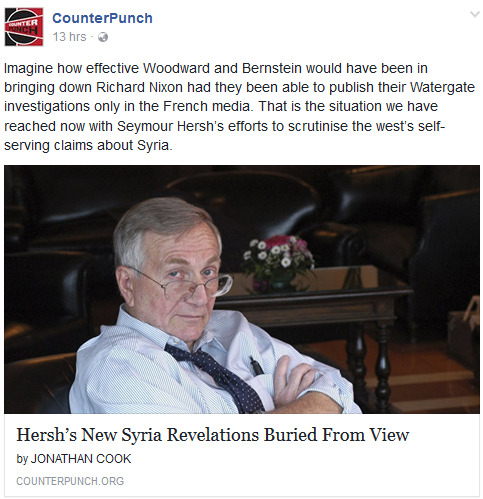
Veteran investigative journalist Seymour Hersh, the man who exposed the Mai Lai massacre during the Vietnam War and the US military’s abuses of Iraqi prisoners at Abu Ghraib in 2004, is probably the most influential journalist of the modern era, with the possible exception of Bob Woodward and Carl Bernstein, the pair who exposed Watergate.
For decades, Hersh has drawn on his extensive contacts within the US security establishment to bring us the story behind the official story, to disclose facts that have often proved deeply discomfiting to those in power and exploded the self-serving, fairy-tale narratives the public were expected to passively accept as news. His stature among journalists was such that, in a sea of corporate media misinformation, he enjoyed a small island of freedom at the elite, but influential, outlet of the New Yorker.
Paradoxically, over the past decade, as social media has created a more democratic platform for information dissemination, the corporate media has grown ever more fearful of a truly independent figure like Hersh. The potential reach of his stories could now be enormously magnified by social media. As a result, he has been increasingly marginalised and his work denigrated. By denying him the credibility of a “respectable” mainstream platform, he can be dismissed for the first time in his career as a crank and charlatan. A purveyor of fake news.
Nonetheless, despite struggling to find an outlet for his recent work, he has continued to scrutinise western foreign policy, this time in relation to Syria. The official western narrative has painted a picture of a psychotic Syrian president, Bashar Assad, who is assumed to be so irrational and self-destructive he intermittently uses chemical weapons against his own people. He does so, not only for no obvious purpose but at moments when such attacks are likely to do his regime untold damage. Notably, two sarin gas attacks have supposedly occurred when Assad was making strong diplomatic or military headway, and when the Islamic extremists of Al-Qaeda and ISIS – his chief opponents – were on the back foot and in desperate need of outside intervention.
Dangerous monsters

Hersh’s investigations have not only undermined evidence-free claims being promoted in the west to destabilise Assad’s goverment but threatened a wider US policy seeking to “remake the Middle East”. His work has challenged a political and corporate media consensus that portrays Russia’s Vladimir Putin, Assad’s main ally against the extremist Islamic forces fighting in Syria, as another dangerous monster the West needs to bring into line.
For all these reasons, Hersh has found himself increasingly friendless. The New Yorker refused to publish his Syria investigations. Instead, he had to cross the Atlantic to find a home at the prestigious but far less prominent London Review of Books.
Back in 2013 his contacts within the security and intelligence establishments revealed that the assumption Assad had ordered the use of sarin gas in Ghouta, outside Damascus, failed to stand up to scrutiny. Even Barack Obama’s national intelligence director, James Clapper, was forced to admit privately that Assad’s guilt was “not a slam dunk”, even as the media widely portrayed it as precisely that. Hersh’s work helped stymie efforts at the time to promote a western military attack to bring down the Syrian government.
His latest investigation questions whether Assad was responsible for another alleged gas attack – this one in April, at Khan Sheikhoun. Again a consensual western narrative was quickly constructed after social media showed dozens of Syrians dead, apparently following a bomb dropped by Syrian aircraft. For the first time in his presidency, Donald Trump received wall-to-wall praise for launching a military strike on Syria in response, even though, as Hersh documents, he had no evidence on which to base such an attack, one that gravely violated international law.
Hersh’s new investigation was paid for by the London Review of Books, which declined to publish it. This is almost disturbing as the events in question.
What is emerging is a media blackout so strong that even the London Review of Books is running scared. Instead, Hersh’s story appeared yesterday in a German publication, Welt am Sonntag. Welt is an award-winning newspaper, no less serious than the New Yorker or the LRB. But significantly Hersh is being forced to publish ever further from the centres of power whose misinformation his investigations are challenging.
Imagine how effective Woodward and Bernstein would have been in bringing down Richard Nixon had they been able to publish their Watergate investigations only in the French media. That is the situation we have reached now with Hersh’s efforts to scrutinise the west’s self-serving claims about Syria.
MORE: COUNTERPUNCH
#seymour hersh#journalism#censorship#war propaganda#imperial narrative#donald trump#syria#amerikkka#nation of lawless nazi psychopaths
1 note
·
View note
Text
Trump's Wag the Dog moment
http://uniteordiemedia.com/trumps-wag-the-dog-moment/ Trump's Wag the Dog moment This conversation goes to show, what looked bad at the time, has been shown to be Trump wagging the media’s dog. Russia and Syria were warned well ahead of time and nothing of importance was hit. This conversation was provided to Seymour Hersh. It is betweeen a security adviser...
This conversation goes to show, what looked bad at the time, has been shown to be Trump wagging the media’s dog.
Russia and Syria were warned well ahead of time and nothing of importance was hit.
This conversation was provided to Seymour Hersh. It is betweeen a security adviser and an active US American soldier on duty on a key operational base about the events in Khan Sheikhoun. We have made abbreviations: American soldier (AS) and Security Advisor (SA). WELT AM SONNTAG is aware of the location of the deployment. For security reasons, certain details of military operations have been omitted.
April 6, 2017
American Soldier: We got a fuckin‘ problem
Security-Adviser: What happened? Is it the Trump ignoring the Intel and going to try to hit the Syrians? And that we’re pissing on the Russians?
AS: This is bad…Things are spooling up.
SA: You may not have seen trumps press conference yesterday. He’s bought into the media story without asking to see the Intel. We are likely to get our asses kicked by the Russians. Fucking dangerous. Where are the godamn adults? The failure of the chain of command to tell the President the truth, whether he wants to hear it or not, will go down in history as one of our worst moments.
AS: I don’t know. None of this makes any sense. We KNOW that there was no chemical attack. The Syrians struck a weapons cache (a legitimate military target) and there was collateral damage. That’s it. They did not conduct any sort of a chemical attack.
Anzeige
AS: And now we’re shoving a shit load of TLAMs (tomahawks) up their ass.
SA: There has been a hidden agenda all along. This is about trying to ultimately go after Iran. What the people around Trump do not understand is that the Russians are not a paper tiger and that they have more robust military capability than we do.
AS: I don’t know what the Russians are going to do. They might hang back and let the Syrians defend their own borders, or they might provide some sort of tepid support, or they might blow us the fuck out of the airspace and back into Iraq. I honestly don’t know what to expect right now. I feel like anything is possible. The russian air defense system is capable of taking out our TLAMs. this is a big fucking deal…we are still all systems go…
SA: You are so right. Russia is not going to take this lying down
SA: Who is pushing this? Is it coming from Votel (General Joseph L. Votel, Commander of United States Central Command, editor‘s note) ?
AS: I don’t know. It’s from someone big though. . . . This is a big fucking deal.
AS: It has to be POTUS.
AS: They [the russians] are weighing their options. Indications are they are going to be passive supporters of syria and not engage their systems unless their own assets are threatened..in other words, the sky is fucking blue.’
April 7, 2017
SA: What are the Russians doing or saying Am I correct that we did little real damage to Russia or Syria?
AS: We didn’t hit a damn thing, thankfully. They retrograded all their aircraft and personnel. We basically gave them a very expensive fireworks display.
AS: They knew where ships were and watched the entire strike from launch to end game.
AS: The Russians are furious. Claiming we have the real Intel and know the truth about the weapons depot strike.
AS: They are correct.
AS: I guess it really didn’t matter whether we elected Clinton or Trump. Fuck.
AS: No one is talking about the entire reason we’re in Iraq and Syria in the first place. That mission is fucked now.
SA: Are any of your colleagues pissed or is everyone going along with it and saying this is OK
AS: It’s a mad house. . . .Hell we even told the Russians an hour before impact
SA: But they clearly knew it was coming
AS: Oh of course
AS: Now Fox is saying we chose to hit the Syrian airfield because it is where the chemical attacks were launched from. Wow. Can’t make this shit up.
SA: They are. I mean, making it up
AS: It’s so fuckin evil
SA: Amen!!!
April 8, 2017
AS: Russians are being extremely reasonable. Despite what the news is reporting they are still trying to deconflict and coordinate the air campaign.
SA: I don’t think the russia yet understands how crazy Trump is over this. And i don’t think we appreciate how much damage the Russians can do to us.
AS: They’re showing amazing restraint and been unbelievably calm. They seem mostly interested in de-escalating everything. They don’t want to lose our support in the help with destroying Isis.
SA: But I get the get the feeling are simply trying this approach for as long as they feel it might work. If we keep pushing this current aggressive stance they’re going to hit back.’
https://www.welt.de/politik/ausland/article165905618/We-got-a-fuckin-problem.html
0 notes
Text
Expert: There has been much disingenuous criticism of those, like me, who question why the western corporate media have studiously ignored the latest investigation by renowned journalist Seymour Hersh on Syria. Hersh had to publish his piece in a German newspaper, Welt am Sonntag, after the entire US and UK media rejected his article. There has still been no mention of his investigation more than a week later. Those who support, either explicitly or implicitly, the meddling in Syria’s affairs by hostile foreign powers are, of course, delighted that Hersh’s revelations are being kept out of the spotlight. They don’t want every side heard, only their side. And those of us who expect all the evidence to be aired, so we aren’t corralled into yet another disastrous “intervention” in the Middle East, are being mischievously denounced as Assad loyalists. A good example of this kind of wilful misrepresentation is by Brian Whitaker, the Guardian’s former Middle East editor. In a recent blog post, he has accused me and Media Lens, among others, of being “loyal supporters of Hersh” – and by insinuation, of Syrian leader Bashar al-Assad – of being “sarin denialists”, and of demonstrating blatant hypocrisy in approving Hersh’s use of anonymous sources when we oppose reliance on such sources by other journalists. Before I address these criticisms, let’s briefly recap on what Hersh’s investigation found. His sources in the US intelligence establishment have countered an official narrative – spread by western governments and the corporate media – that assumes Assad was behind a chemical weapons attack on the town of Khan Sheikhoun on April 4. Hersh’s account suggests that Syria used a conventional bomb to hit a jihadist meeting in the town, triggering secondary explosions in a storage depot containing pesticides, fertilisers and chlorine-based decontaminants. A toxic cloud was created that caused symptoms similar to sarin for those nearby. Trump was so convinced that Assad had used sarin in Khan Sheikhoun that he violated international law and fired 59 Tomahawk missiles at a Syrian airbase as punishment, even though, according to Hersh, his own intelligence community disputed that this is what had happened. Given that Vladimir Putin is closely allied with Assad, the move had the potential to drag Russia into a dangerous confrontation with the US. So let me address Whitaker’s allegations. 1. Neither I nor Media Lens are “loyal supporters” of Hersh – or Assad. Whitaker is projecting. He has chosen a side in Syria – that of what he simplistically terms the “rebels”, now dominated by Al-Qaeda affiliates and ISIS, backed by an unholy alliance of Saudi Arabia, the US, Europe, Israel and Turkey. But not everyone who opposes the Islamic extremists, or Whitaker’s group of western interventionists, has therefore chosen Assad’s side. One can choose the side of international law and respect for the sovereignty of nation-states, and object to states fomenting proxy wars to destabilise and destroy other regimes. More than that, one can choose to maintain a critical distance and, based on experience, remain extremely wary of official and self-serving narratives promoted by the world’s most powerful states. Some of us think there are lessons to be learnt from the lies we were told about WMD in Iraq, or a supposedly imminent massacre by Libya’s Muammar Gaddafi in Benghazi. These examples of deception should be remembered when we try to assess how probable is the story that Assad wanted to invite yet more destructive interference in his country from foreign powers by gassing his own people – and to no obvious strategic or military advantage. Fool me once, shame on you. Fool me three times, I should just admit I am a gullible fool. I and Media Lens (if I may presume to speak on their behalf as a longtime follower) are not arguing that Hersh’s account must be right. Just that it deserves attention, and that it should be part of the media/public discourse. What concerns us is the inadmissibility of relevant information to the public realm, and concerted efforts to stifle debate. Manufactured groupthink, it has been repeatedly shown, works to the benefit of the powerful, those promoting the destructive interests of a now-global military-industrial complex. Whitaker and the interventionists want only the official narrative allowed, the one that serves their murky political agenda; we want countervailing voices heard too. That doesn’t make us anyone’s loyalists. It makes us loyal only to the search for transparency and truth. 2. Whitaker suggests that I and Media Lens have ascribed the failure by the corporate media to report on Hersh’s investigation to a “conspiracy”. He argues instead that Hersh has been ignored because “editors found [his recent Syria] articles flaky”. Neither I nor Media Lens, of course, are claiming the corporate media’s decision is a conspiracy. Like most mainstream journalists, Whitaker shows how ignorant he is of the most famous critique of his own profession: Noam Chomsky and Ed Herman’s Propaganda Model. That posits not a conspiracy of journalists but structural factors that make a corporate-owned media, one dependent on corporate advertising, incapable of allowing any meaningful pluralism of the kind that might threaten its own core interests. That is no more to state a conspiracy than it would be to argue that corporations are driven by profit. It is simply to recognise the nature of the beast. Aside from that, Whitaker treats Hersh as though he is a one-off, a lone, non-credible voice with a hidden pro-Assad agenda, using anonymous sources in the US intelligence world, presumably with the same hidden agenda. Those like me who want Hersh’s account visible are dismissed as “sarin denialists”, partisans so blinded by our secret love of Assad that we refuse to admit the evidence staring us in the face. But Whitaker is mischaracterising the evidence. The doubts raised by Hersh’s investigation have been shared by former senior intelligence and security officials, such as Lawrence Wilkerson, Philip Giraldi and Ray McGovern, as well as journalists with extensive contacts in the intelligence field, such Robert Parry and Gareth Porter. Concerns with the official narrative have also been raised by undoubted experts on ballistic and chemical weapons issues, such as Ted Postol and Scott Ritter. They doubt a sarin attack by Assad’s forces took place, based on technical matters they are well-placed to judge. Remember it was Ritter, a weapons inspector in Iraq, who warned that Saddam Hussein had no WMDs as the US and UK were making precisely the opposite, mendacious case for war. Ritter’s voice was excluded from the corporate media in 2002-03, precisely when it might have pulled the rug from under those in the political and media establishments cheering on the disastrous US-UK invasion of Iraq. Whitaker and the interventionists argue, apparently with a straight face, that this time the corporate media are silencing Hersh only because of a supposed “flakiness” in his journalism. So how do they explain the fact that in 2002-03 the same media silenced experts like Ritter and Hans Blix, former head of the UN agency monitoring Iraq’s weapons programme, while aggressively promoting entirely flaky individuals like the supposed Iraqi “opposition leader” Ahmed Chalabi? If the media considered Ritter and Blix, but not Chalabi, as flaky in the run-up to the illegal Iraq invasion, maybe it’s time for Whitaker and editors like him to reassess the meaning of “flaky”. 3. Finally, what of the claim that it is hypocritical to allow Hersh his anonymous sources when we disapprove of them in other cases? First, the issue of using anonymous sources does not need to be judged according to our own standards, but rather those of the corporate media. Mainstream editors have repeatedly proved they have absolutely no problem using anonymous sources when they support the official narrative, one that promotes war. Liberal papers like the New York Times are filled most days with stories from unnamed officials, telling us what we are supposed to believe. The fake “revelations” of Saddam’s WMD were largely sourced from anonymous officials over many months. Whitaker himself worked as an editor at the Guardian when it was running similarly unverifiable stories from anonymous sources. So our complaints about Hersh’s treatment are based, in part, on the glaring hypocrisy of journalists like Whitaker. Why are anonymous sources fine when they confirm the narrative of the security state, but problematic – “flaky” – when they challenge it? Whitaker doesn’t have a problem with Hersh using anonymous sources, any more than does the Guardian, New York Times, New Yorker, or London Review of Books. They have a problem with Hersh using anonymous sources when those sources say things that are not supposed to be said. And second, there is a world of difference between using anonymous sources to reveal things the powerful do not want stated, and using anonymous sources to say exactly what the security state wants to be said but does not want to be held accountable for. Whistleblowers and those who challenge the powerful often need protection in the form of anonymity from the likely retaliation of state actors. Anonymity is never ideal, but sometimes it is necessary. And when necessary, as in the case of whistleblowers, safeguards should be put in place. They appear to have been in the case of the Hersh investigation. Fact-checkers like Scott Ritter were used to ensure the story was technically plausible, and Welt editors say they were given the identities of Hersh’s sources. The intelligence officials who spoke to Hersh may be unknown to the reader, but they are apparently known to the editors overseeing the story’s publication. Contrast that to the anonymous government, military and intelligence officials who regularly brief journalists anonymously, often to spread what turns out to be misinformation. There is no reason why any official needs to be unnamed when they are acting as spokesperson for their government. The only protection such anonymity offers is protection from accountability. Finally, it is worth noting that Syria has become a hugely divisive issue on the left, as Libya did before it. It has made the left all but powerless to advance any kind of critique of western imperialism and its current round of violent interference in the Middle East. The spirit that spurred the global marches in 2003 against the attack on Iraq has dissipated. The left’s confusion allowed Libya to be torn to shreds on the pretext of a non-existent threat to Benghazi. And now Syria is being wrecked by proxy wars in which the west is a central, if largely veiled, actor. None of this is accidental. The US has long had a plan to destabilise and break apart the Middle East – sometimes referred to by officials as “remaking” it – to better control the region’s resources. And hand in glove with this plan are efforts to destabilise and break apart those who should be dissenting from the latest bouts of western imperialism. http://clubof.info/
0 notes
Note
🤥🌙👑 for whoever comes to mind? :3
hmmmm I think I will answer for Seymour since I haven't really talked about him much!
🤥 LYING - are they good liars? do they have tells to show they're lying?
he thinks hes a good liar (he is not), he touches his face a lot, wont make eye contact, his voice will crack randomly, etc etc
🌙 MOON - what is your oc's greatest wish? how far are they willing to go for it?
he reallly wants to do good by his deceased daughter, he wants to be the man that he wishes he could have been for her when she was still alive, and hes willing to go to the ends of the earth to make sure he accomplishes it
👑 CROWN - what does your oc want to be remembered as? why?
he wants to be remembered as someone that was willing to give it his best, that he tried to make a difference or tried to help people, he feels like maybe if he helps enough people that he can atone for her daughters death (which he believes was his fault)
4 notes
·
View notes
Photo
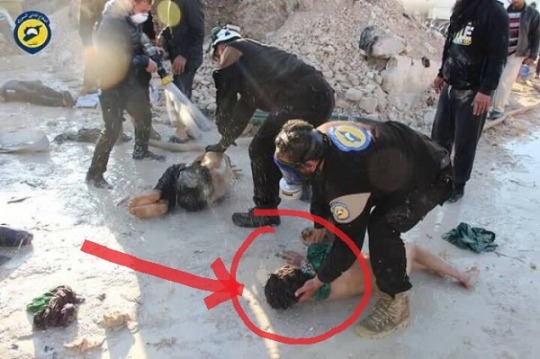
“We got a fuckin‘ problem“ Seymour Hersch — Welt am Sonntag June 25, 2017 Intelligence officials doubted the alleged Sarin gas attack at Khan Sheikhoun.
0 notes
Photo
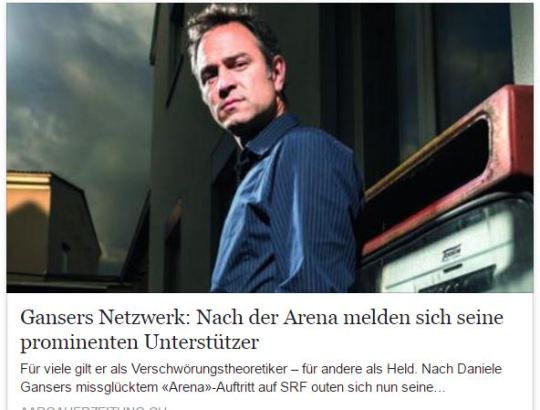
"Der Basler Historiker Daniele Ganser polarisiert“ schreiben die AZ Medien am 4. März 2017. Die AZ Medien haben bis vor kurzem die „Schweiz am Sonntag“ publiziert, mussten diese Zeitung aber aus wirtschaftlichen Gründen einstellen, weil die verkauften Exemplare und die Werbeeinnahmen einbrachen. Die Printmedien stecken in der Krise. Neu erscheint das Blatt von Chefredaktor Patrik Müller als „Schweiz am Wochenende“. In der ersten Ausgabe geht die neue Zeitung auf den Eklat in der Arena ein. Dieser hat dazu geführt, dass nun in der Schweiz darüber diskutiert wird, ob man erstens den Medien trauen kann, und ob man zweitens 911 und WTC7 neu untersuchen darf.
Meine Haltung zu den Medien ist klar: Es gibt gute und schlechte Journalisten. Welche gut sind, muss jeder selber herausfinden. Der Amerikaner Seymour Hersh zum Beispiel ist ein ausgezeichneter Journalist. Der Schweizer Erich Gysling ist auch ein ausgezeichneter Journalist, dasselbe gilt für den deutschen Journalisten Michael Lüders.
Auch meine Haltung zu 911 und WTC7 ist klar: Natürlich muss der Einsturz des dritten Gebäudes neu untersucht werden, weil das der Startschuss für den unsäglichen „Krieg gegen den Terror“ war, der schon mehr als 1 Million Menschen das Leben kostete und die Rüstungsausgaben in die Höhe trieb während der Überwachungsstaat ausgebaut wurde:
http://www.aargauerzeitung.ch/schweiz/gansers-netzwerk-nach-der-arena-melden-sich-seine-prominenten-unterstuetzer-131070583
0 notes
Photo
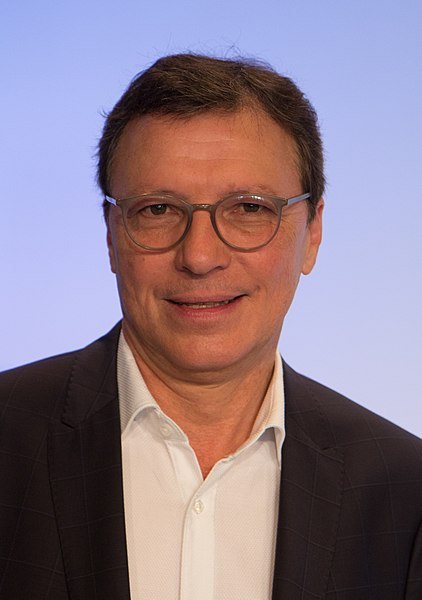

Verleihung des Grimme-Preises 2018.
Der Grimme-Preis (bis 2010 Adolf-Grimme-Preis zählt zu den renommiertesten Auszeichnungen für Fernsehsendungen in Deutschland. Er wurde nach dem ersten Generaldirektor des Nordwestdeutschen Rundfunks, Adolf Grimme (1889–1963), benannt.
Volker Herres (* 23. Juli 1957 in Cuxhaven) ist ein deutscher Fernsehjournalist und Programmdirektor des ARD-Gemeinschaftsprogramms Das Erste.
Herres’ journalistische Arbeit begann nach dem Diplom 1983 zunächst als Mitarbeiter im Berliner ZDF-Studio, wo er für das politische Ost-West-Magazin Kennzeichen D tätig war. Seit 1984 arbeitete Herres in der ZDF-Zentrale in Mainz als innenpolitischer Reporter und Moderator für Sendungen wie Länderspiegel, die politische Gesprächsreihe „Was nun …?“, in Wahl-Sendungen sowie als Autor von Dokumentationen und Reportagen. 1986 ging er als Reporter für die aktuelle bundespolitische Berichterstattung ins Bonner Studio des ZDF.
1987 wechselte Herres zum Norddeutschen Rundfunk nach Hamburg, wo er zunächst als Referent in der Intendanz arbeitete, deren Leiter und Sprecher er 1991 wurde. Hier initiierte und steuerte er das interne betriebswirtschaftliche Modernisierungsprogramm „Zukunftssicherung und Kostensenkung“, in dessen Rahmen mehr als 500 Planstellen im NDR abgebaut, unternehmerische Strukturen verschlankt und Mittel zur Stärkung des Programms umgeleitet wurden. Herres war weiterhin beteiligt an der Erweiterung des NDR vom Drei- zum Vier-Länder-Sender nach der Öffnung der innerdeutschen Grenze. In diese Zeit fiel auch der ARD-Vorsitz des NDR.
1995 wurde Herres Fernseh-Chefredakteur des NDR und Leiter des Programmbereichs Zeitgeschehen und damit verantwortlich für alle Informationssendungen des NDR im Ersten Deutschen Fernsehen – „Panorama“, „Plusminus“, „Weltspiegel“, u. a. – sowie für aktuelle Angebote im NDR Fernsehen. Seither moderierte er auch viele Wahl- und Sondersendungen sowie den ARD-Brennpunkt.
Im April 2007 führte er ein Gespräch mit Michael Buback, Sohn des von der RAF ermordeten Siegfried Buback, und dem früheren RAF-Mitglied Peter-Jürgen Boock; die Sendung wurde für den Deutschen Fernsehpreis nominiert. Herres ist außerdem regelmäßiger Kommentator in den Tagesthemen. Im Wechsel mit WDR-Chefredakteur Jörg Schönenborn moderiert er die ARD-Sendung Presseclub.
Lange Zeit galt Herres als Favorit für die Nachfolge von NDR-Intendant Jobst Plog, wurde aber im Sommer 2007 nicht vom Verwaltungsrat des NDR nominiert. Im selben Jahr war er auch als Chefredakteur des Hamburger Nachrichtenmagazins Der Spiegel im Gespräch.
ARD
Im November 2007 beriefen die Intendanten der ARD in Bremen Herres einstimmig zum Nachfolger von Günter Struve als Programmdirektor des Ersten Deutschen Fernsehens.
Der Presseclub ist eine Informationssendung, die wöchentlich sonntags von 12:03 Uhr bis 12:45 Uhr ausgestrahlt wird. Sie wird sowohl im Fernsehen im Ersten und auf Phoenix als auch im Radio auf WDR 5 übertragen.
Die Sendung wurde am 27. Dezember 1987 in Nachfolge des Internationalen Frühschoppens von Werner Höfer zum ersten Mal ausgestrahlt. In der Sendung diskutieren vier bis fünf Journalisten aktuelle Themen. Anders als die Vorgängersendung ist der Presseclub nur noch deutschlandbezogen, ausländische Journalisten werden sehr selten eingeladen. Anschließend haben die Zuschauer 15 Minuten Zeit, telefonisch Fragen zu stellen (Presseclub nachgefragt). Dieser interaktive Teil der Sendung wird allerdings nur auf Phoenix und im Hörfunkprogramm WDR 5 ausgestrahlt. Die Sendung zeichnet sich im Allgemeinen durch eine ruhige Gesprächsatmosphäre aus.
Die Moderatoren waren bzw. sind:
1987–1988: Rolf Schmidt-Holtz
1988–1993: Dieter Thoma
1988–2001: Gerhard Fuchs (Nachfolger von Schmidt-Holtz)
1993–Ende 2006: Fritz Pleitgen (Nachfolger von Thoma)
2001–14. Oktober 2007: Peter Voß (Nachfolger von Fuchs)
2005–2013 Monika Piel (Nachfolgerin von Pleitgen)
seit September 2007: Volker Herres (Nachfolger von Voß)
seit 2008: Jörg Schönenborn
seit 2008: Tina Hassel (vertretungsweise)
seit 2012: Sonia Seymour Mikich (vertretungsweise)
seit 2018: Ellen Ehni (Nachfolgerin von Mikich
Sein neues Amt trat Herres im November 2008 an. Anschließend führte er für die ARD Verhandlungen mit der Deutschen Fußball-Liga DFL über die Vergabe der Fernsehübertragungsrechte an der Fußball-Bundesliga und sicherte diese für vier Jahre für den öffentlich-rechtlichen Senderverbund.
Die Bundesliga-Sportschau ist bis heute ein fester Bestandteil des Programmangebotes im ARD-Gemeinschaftsprogramm. Herres holte zudem die bisher von RTL übertragene Verleihung des deutschen Musikpreises „Echo Pop“ zurück in Das Erste, die bis 2016 übertragen wurde. Ferner etablierte er eine Partnerschaft mit den Pop- und jungen ARD-Radiowellen. 2010 wurde mit „Unser Star für Oslo“ eine Partnerschaft mit Pro7 und Stefan Raab eingegangen, um gemeinsam den Eurovision Song Contest in Deutschland neu zu konzipieren.
28 Jahre nach dem Triumph von Nicole gewann im selben Jahr mit Lena Meyer-Landrut wieder eine Deutsche den europäischen Musikwettbewerb.
Im Herbst 2011 führte er eine wöchentliche Gesprächssendung mit Günther Jauch ein und verband dies mit einer Reform des Programmschemas des Ersten.
2012 schuf Herres einen Primetime-Sendeplatz für das Sommer-Kino im Ersten. In seiner Funktion hat er auch über Programmänderungen und den Einsatz von Sondersendungen zu entscheiden, was ihm anlässlich der Berichterstattung zur Überwachungs- und Spionageaffäre 2013 Kritik einbrachte.
Zu einem Markenzeichen des Ersten entwickelte er sogenannte Event-Programmierungen, also die Kombination von Fernsehfilmen mit anschließender journalistischer Vertiefung des Themas.
2013 initiierte er die bis dato aufwändigste und teuerste TV-Serie Babylon Berlin, die gemeinsam mit X-Filme, Sky und Beta-Film realisiert wurde und am 28. September 2017 in Berlin und am 6. Oktober 2017 in Los Angeles Weltpremiere feierte. 2014 etablierte er am Donnerstag nach den Tagesthemen einen Regelsendeplatz für Comedy- und Satireformate.
2016 war er als Kandidat für das Amt des rbb-Intendanten gefragt, stand aber nicht zur Verfügung. Sein Vertrag als Programmchef des Ersten wurde 2012 und dann erneut 2017 verlängert.
Neben- und Ehrenämter
Herres ist Vorsitzender des Vorstandes der Deutschen Journalistenschule, München, e. V. und im Beirat der Hamburg Media School (HMS) sowie Gründungsmitglied der Deutsch-Türkischen Stiftung. Daneben sitzt er im Kuratorium der Hamburger Akademie für Publizistik, e. V., im Kuratorium der Jugendpresse Deutschland sowie im Aufsichtsrat der gemeinsamen Sportrechteagentur von ARD und ZDF, der SportA.
Von Januar 2009 bis November 2012 war er auch nebenamtlicher Geschäftsführer der ARD-Filmeinkaufs- und Produktionstochtergesellschaft Degeto. Danach wechselte er in den Degeto-Aufsichtsrat. 2013 wurde er „für die gute und stetige Berichterstattung über Reitsport im Ersten“, so der damalige Bahnchef Rüdiger Grube in seiner Laudatio, mit dem PSI-Medien-Award der P.S.I. Sporthorses GmbH ausgezeichnet. Seit 2014 ist er auch „Member of the International Academy of Television Arts & Sciences“. Ferner ist er Mitglied im Rotary-Club München. 2002 erhielt er den DUH-Umwelt-Medienpreis in der Kategorie Sonderpreis.
0 notes
Photo
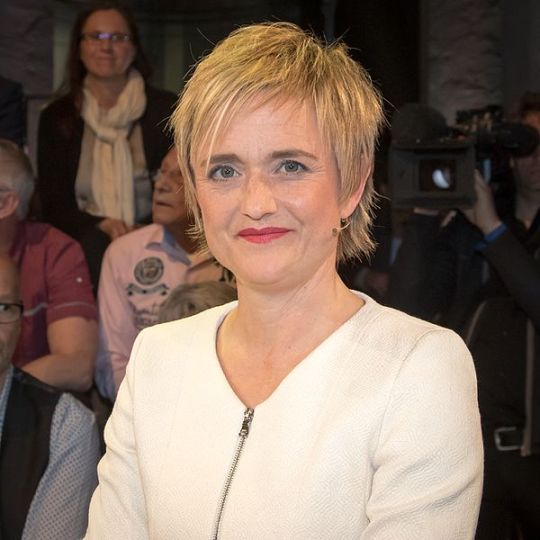
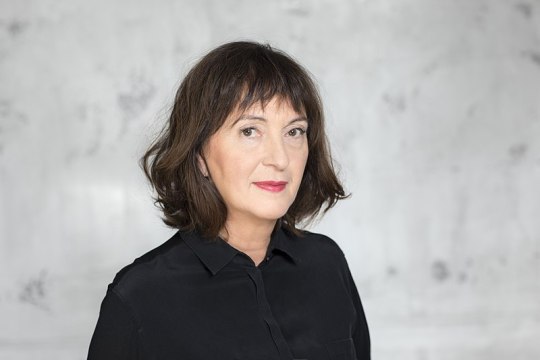
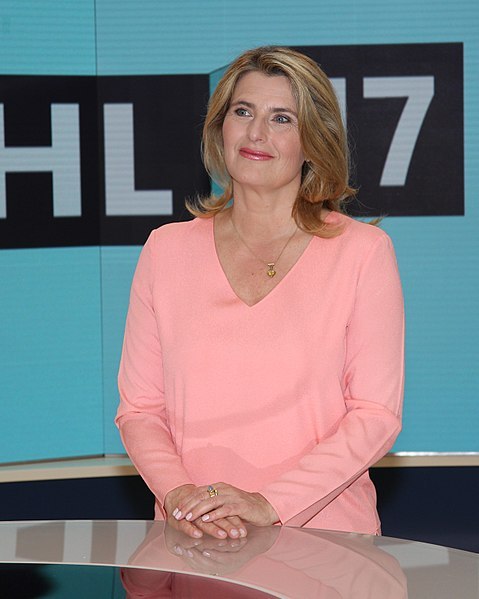
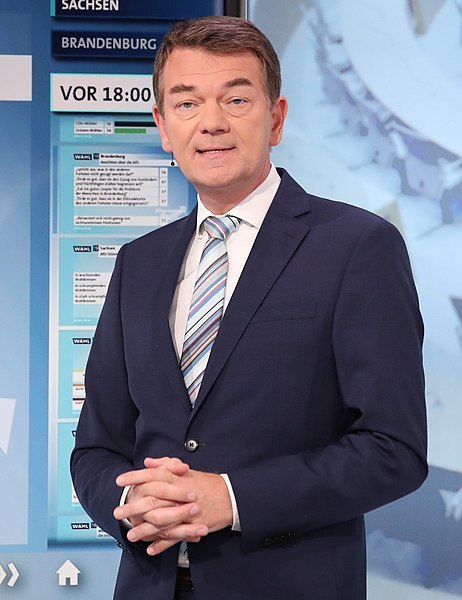
Ellen Ehni (* 1973 in Heidelberg) ist eine deutsche Journalistin, Juristin und Fernsehmoderatorin. Beim Westdeutschen Rundfunk (WDR) ist sie Chefredakteurin Fernsehen und leitet den Programmbereich Politik und Zeitgeschehen.
Beim WDR stieg Ehni 2004 als Redakteurin der Programmgruppe Wirtschaft und Recht ein und war für die Sendungen Markt, Plusminus und ARD Ratgeber Recht tätig. Letztere moderierte sie auch, ebenso wie, als Vertreterin, das ARD-Morgenmagazin. Im Jahr 2007 wechselte sie für fünf Jahre ins Studio Paris als ARD-Korrespondentin. Die Programmgruppe Wirtschaft und Recht leitet sie seit dem Jahr 2012. Sie ist weiterhin als Moderatorin tätig, u. a. beim DeutschlandTrend in den Tagesthemen und bei Ausgaben des ARD-Brennpunkt sowie der Sendung Plusminus.
Wirken
Ehni setzt sich dafür ein, dass auch Führungskräfte im WDR ihren Job gut mit dem Familienleben vereinbaren können. Darüber hinaus ist es ihr ein Anliegen, gegen die „ungesunde Polarisierung“ in der Gesellschaft anzugehen. „Ehni beschreibt in acht Punkten, was verantwortlicher Journalismus leisten muss. Sie sagt: Wir müssen zuhören. Wir müssen die Leisen sichtbar machen. Und wir müssen vielfältiger werden.“
Der Presseclub ist eine Informationssendung, die wöchentlich sonntags von 12:03 Uhr bis 12:45 Uhr ausgestrahlt wird. Sie wird sowohl im Fernsehen im Ersten und auf Phoenix als auch im Radio auf WDR 5 übertragen.
Die Sendung wurde am 27. Dezember 1987 in Nachfolge des Internationalen Frühschoppens von Werner Höfer zum ersten Mal ausgestrahlt. In der Sendung diskutieren vier bis fünf Journalisten aktuelle Themen. Anders als die Vorgängersendung ist der Presseclub nur noch deutschlandbezogen, ausländische Journalisten werden sehr selten eingeladen. Anschließend haben die Zuschauer 15 Minuten Zeit, telefonisch Fragen zu stellen (Presseclub nachgefragt). Dieser interaktive Teil der Sendung wird allerdings nur auf Phoenix und im Hörfunkprogramm WDR 5 ausgestrahlt. Die Sendung zeichnet sich im Allgemeinen durch eine ruhige Gesprächsatmosphäre aus.
Die Moderatoren waren bzw. sind:
1987–1988: Rolf Schmidt-Holtz
1988–1993: Dieter Thoma
1988–2001: Gerhard Fuchs (Nachfolger von Schmidt-Holtz)
1993–Ende 2006: Fritz Pleitgen (Nachfolger von Thoma)
2001–14. Oktober 2007: Peter Voß (Nachfolger von Fuchs)
2005–2013 Monika Piel (Nachfolgerin von Pleitgen)
seit September 2007: Volker Herres (Nachfolger von Voß)
seit 2008: Jörg Schönenborn
seit 2008: Tina Hassel (vertretungsweise)
seit 2012: Sonia Seymour Mikich (vertretungsweise)
seit 2018: Ellen Ehni (Nachfolgerin von Mikich
0 notes
Text
Expert: If you wish to understand the degree to which a supposedly free western media are constructing a world of half-truths and deceptions to manipulate their audiences, keeping us uninformed and docile, then there could hardly be a better case study than their treatment of Pulitzer prize-winning investigative journalist Seymour Hersh. All of these highly competitive, for-profit, scoop-seeking media outlets separately took identical decisions: first to reject Hersh’s latest investigative report, and then to studiously ignore it once it was published in Germany last Sunday. They have continued to maintain an absolute radio silence on his revelations, even as over the past few days they have given a great deal of attention to two stories on the very issue Hersh’s investigation addresses. These two stories, given such prominence in the western media, are clearly intended to serve as “spoilers” to his revelations, even though none of these publications have actually informed their readers of his original investigation. We are firmly in looking-glass territory. So what did Hersh’s investigation reveal? His sources in the US intelligence establishment – people who have helped him break some of the most important stories of the past few decades, from the Mai Lai massacre by American soldiers during the Vietnam war to US abuse of Iraqi prisoners at Abu Ghraib in 2004 – told him the official narrative that Syria’s Bashar Assad had dropped deadly sarin gas on the town of Khan Sheikhoun on April 4 was incorrect. Instead, they said, a Syrian plane dropped a bomb on a meeting of jihadi fighters that triggered secondary explosions in a storage depot, releasing a toxic cloud of chemicals that killed civilians nearby. It is an alternative narrative of these events that one might have assumed would be of intense interest to the media, given that Donald Trump approved a military strike on Syria based on the official narrative. Hersh’s version suggests that Trump acted against the intelligence advice he received from his own officials, in a highly dangerous move that not only grossly violated international law but might have dragged Assad’s main ally, Russia, into the fray. The Syrian arena has the potential to trigger a serious confrontation between the world’s two major nuclear powers. But, in fact, the western media were supremely uninterested in the story. Hersh, once considered the journalist’s journalist, went hawking his investigation around the US and UK media to no avail. In the end, he could find a home for his revelations only in Germany, in the publication Welt am Sonntag. There are a couple of possible, even if highly improbable, reasons all English-language publications ignored Hersh’s story. Maybe they had evidence that his inside intelligence was wrong. If so, they have yet to provide it. A rebuttal would require acknowledging Hersh’s story, and none seem willing to do that. Or maybe the media thought it was old news and would no longer interest their readers. It would be difficult to sustain such an interpretation, but at least it has an air of plausibility – except for everything that has happened since Hersh published last Sunday. His story has spawned two clear “spoiler” responses from those desperate to uphold the official narrative. Hersh’s revelations may have been entirely uninteresting to the western media, but strangely they have sent Washington into crisis mode. Of course, no US official has addressed Hersh’s investigation directly, which might have drawn attention to it and forced western media to reference it. Instead Washington has sought to deflect attention from Hersh’s alternative narrative and shore up the official one through misdirection. That alone should raise the alarm that we are being manipulated, not informed. The first spoiler, made in the immediate wake of Hersh’s story, were statements from the Pentagon and White House warning that the US had evidence Assad was planning yet another chemical attack on his people and that Washington would respond extremely harshly if he did so. Here is how the Guardian reported the US threats: The US said on Tuesday that it had observed preparations for a possible chemical weapons attack at a Syrian air base allegedly involved in a sarin attack in April following a warning from the White House that the Syrian regime would ‘pay a heavy price’ for further use of the weapons. And then on Friday, the second spoiler emerged. Two unnamed diplomats “confirmed” that a report by the Organisation for the Prohibition of Chemical Weapons (OPCW) had found that some of the victims from Khan Sheikhoun showed signs of poisoning by sarin or sarin-like substances. There are obvious reasons to be mightily suspicious of these stories. The findings of the OPCW were already known and had been discussed for some time – there was absolutely nothing newsworthy about them. There are also well-known problems with the findings. There was no “chain of custody” – neutral oversight – of the bodies that were presented to the organisation in Turkey. Any number of interested parties could have contaminated the bodies before they reached the OPCW. For that reason, the OPCW has not concluded that the Assad regime was responsible for the traces of sarin. In the world of real news, only such a finding – that Assad was responsible – should have made the OPCW report interesting again to the media. Similarly, by going public with their threats against Assad, the Pentagon and White House did not increase the deterrence on Assad, making it less likely he would use gas in the future. That could have been achieved much more effectively with private warnings to the Russians, who have massive leverage over Assad. These new warnings were meant not for Assad but for western publics, to bolster the official narrative that Hersh’s investigation had thrown into doubt. In fact, the US threats increase, rather than reduce, the chances of a new chemical weapons attack. Other, anti-Assad actors now have a strong incentive to use chemical weapons in false-flag operation to implicate Assad, knowing that the US has committed itself to intervention. On any reading, the US statements were reckless – or malicious – in the extreme and likely to bring about the exact opposite of what they were supposed to achieve. But beyond this, there was something even more troubling about these two stories. That these official claims were published so unthinkingly in major outlets is bad enough. But what is unconscionable is the media’s continuing blackout of Hersh’s investigation when it speaks directly to the two latest news reports. No serious journalist could write up either story, according to any accepted norms of journalistic practice, and not make reference to Hersh’s claims. They are absolutely relevant to these stories. In fact, more than that, the intelligence sources he cites are are not only relevant but are the sole reason these two stories have been suddenly propelled to the top of the news agenda. Any publication that has covered either the White House-Pentagon threats or the rehashing of the OPCW report and has not mentioned Hersh’s revelations is writing nothing less than propaganda in service of a western foreign policy agenda trying to bring about the illegal overthrow the Syrian government. And so far that appears to include every single US and UK mainstream newspaper and TV station. http://clubof.info/
0 notes
Text
Expert: Having ordered the attack on the al-Shayrat air field near the western Syrian city of Homs, U.S. President Donald Trump knew that the Syrian government hadn’t used any chemical weapons in Khan Shaykhun. At the same time the current U.S. administration was making every effort to develop an information campaign against Damascus. This was reported by Welt am Sonntag, a German Sunday newspaper. An American investigative journalist and political writer Seymour Hersh stressed that actually the Syrian Air Force had targeted a two-story building, where extremists from various terrorist groups held meetings. According to Hersh, a bomb, dropped by the Syrian aircraft in Khan Shaykhun, caused a number of detonations. The explosion led to the formation of a cloud of noxious vapour. Washington was knowledgeable about that. The attack became an ideal occasion for the U.S. to make further accusations against Damascus. After a short time, the world media started to spread staged footage and photos from Khan Shaykhun. Those materials showed injured people, who were allegedly dying in a suspected sarin chemical attack. Permanent representatives of a number of Western countries to the UN also made every effort to put all responsibility for the incident on the Syrian government, headed by President Bashar al-Assad. Thus, Nikki R. Haley, the United States ambassador to the United Nations, at a Security Council meeting even showed photos, allegedly proving the ‘crimes’ of the Syrian authorities against Syrians. In addition, the U.S., France, Britain proposed the UN SC draft several resolutions on the Syrian gas attack. The documents were aimed to provide an international investigation with flight plans and logs, the names of all helicopter squadron commanders and to provide access to air bases where investigators believe attacks using chemicals were launched. It also should be mentioned that despite Syria’s readiness to cooperate with the specialists from the Organization for the Prohibition of Chemical Weapons (OPCW), an official investigation into the incident in Khan Shaykhun has not been launched yet. Moreover, Western countries continue to expand sanctions against Syria to escalate the economic situation in the country and drag it into an endless war. Seymour Hersh, referring to information received from a senior adviser in the U.S. intelligence services, reported that Washington had no evidence that the Syrian Army used sarin gas. The CIA also informed the White House that no poisonous substances were found in the al-Shayrat air field, and al-Assad had no reason to commit political suicide. According to many Syrian experts, it is possible that the world will soon become aware of the United States’ participation in other major scandals and incidents in Syria. http://clubof.info/
0 notes